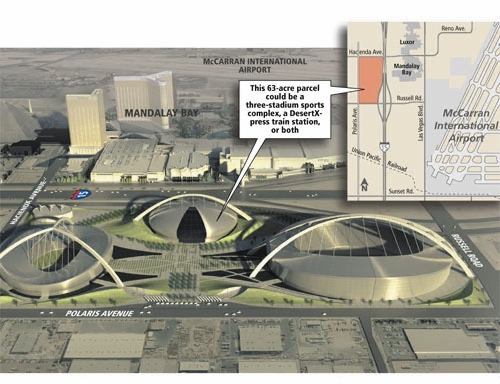Sports complex developer has eye on site sought by DesertXpress

Two multibillion-dollar Las Vegas developments appear to be targeted for the same piece of vacant desert, though no one appears to know how — or even if — the two can coexist.
Earlier this month, the 63-acre site west of Interstate 15 across from Mandalay Bay was revealed as the proposed home of a $1.95 billion, three-stadium sports complex.
The developer said he would ask lawmakers to make it a special taxing district to help finance construction of the venues, which would include a new home for the Las Vegas 51s Triple-A baseball team he plans to buy.
What Texas developer Christopher Milam hasn’t said in various presentations and public statements: The same 63 acres were identified in March as the preferred station site for the $4 billion DesertXpress high-speed train connecting Las Vegas with Victorville, Calif., proposed by another private company.
Milam, asked about the possible conflict, said Thursday his three-stadium Las Vegas National Sports Center and the train station might be able to share the site.
"The drawings indicate the station is not very large," Milam said in an email. "We believe we could accommodate what’s shown in these drawings by integrating the station into our venue master plan (probably tied to the stadium). That could yield a terrific result."
But how the two might coexist is unclear.
"We are not, however, railroad engineers or financiers, and no one from (DesertXpress) has approached us about integrating this prospective station into our development," Milam said.
Today, Milam’s representatives in Carson City are expected to deliver a 300-plus-page binder to all state lawmakers while detailing the multiple-stadium project and its potential economic impact. But nowhere in a binder reviewed Thursday by the Review-Journal was there a single mention of a train station on the site. It’s unclear why that detail was omitted.
DesertXpress’ promoters identified the station site, bordered by Polaris Avenue on the west, Dean Martin Drive on the east, Hacienda Avenue to the north and Russell Road to the south, in an environmental impact statement issued in March.
The train’s developers also named a potential alternative in the environmental impact statement, which is now under review by the Federal Railroad Administration.
Authors of the environmental impact statement said the site’s advantages include proximity to the south end of the Strip and to McCarran International Airport, and the fact that it is "undeveloped and would not require displacement or demolition of any existing development."
The site is owned by a consortium of banks that obtained it through foreclosure, but Milam says he has signed a sales agreement and has put down a nonrefundable deposit. While he now controls the site, he says he would complete the deal only if he moves forward with the stadiums.
Milam said Thursday that the landowners were unaware of DesertXpress’ station plans, and that he discovered it while doing diligence on his deal.
Greg Gilbert, legal counsel for DesertXpress, said the company hasn’t taken a stance on any potential Las Vegas station site, and has identified another possible location west of Interstate 15, just off Flamingo Road near the Rio.
"It’s premature for us to have a position on any location," Gilbert said. "This is not an adversarial issue."
Milam’s group, International Development Management, is asking the Nevada Legislature to create a special taxing district at the site to help pay for the project, which would include a 9,000-seat baseball park, a 17,500-seat arena for a National Basketball Association team, and a 36,000-seat stadium for a Major League Soccer squad.
Milam said this week the stadium project might be scuttled unless the Legislature approves the special taxing district, which would add a 12 percent ticket sales tax for any event at the three arenas.
The legislation would also allow stadium owners to keep sales, live entertainment, property and other taxes generated there for reinvestment in the facilities.
Meanwhile, real estate analysts say DesertXpress principals would likely seek to acquire the site through eminent domain. According to the environmental impact statement, almost all of the site — 57.09 acres — would be needed for the train station and related facilities to serve more than 4 million passengers per year.
The high-speed trains would travel at speeds of up to 150 mph and transport passengers 186 miles between Las Vegas and Victorville in about 80 minutes. It’s envisioned that the line eventually would extend to Palmdale, Calif., where it would link into an ambitious statewide high-speed rail project.
DesertXpress has some big-name supporters, including U.S. Senate Majority Leader Harry Reid.
Las Vegas marketing executive and political consultant Sig Rogich has ties as an investor to DesertXpress Enterprises LLC even as his public relations firm, The Rogich Communications Group, represents Milam and the stadium development.
A representative of Rogich declined comment Thursday.
In October 1988, Los Angeles-based Weststate Land paid roughly $5.73 million for 58 acres of the current stadium/station site. In 2004, the company bought the adjacent 4.2 acres for $8.3 million.
Six years ago, the stadium/station site was valued at $15 million to $20 million per acre, according to real estate analysts.
The acreage, slightly smaller than the 67 acres that houses CityCenter, is zoned for a hotel-casino; but it has remained empty as land values dropped and the recession halted development and acquisitions.
Contact reporter Howard Stutz at hstutz@reviewjournal.com or 702-477-3871. Follow @howardstutz on Twitter.